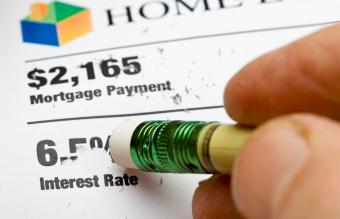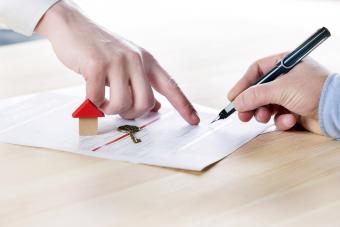
House payments consume a major portion of most people's monthly budgets, so it's natural to think about taking steps to save money on this major expense. There are many situations in which getting a new mortgage enables one to save significant amounts of money and weighing each of these factors carefully helps you decide whether or not to refinance.
Refinancing to Reduce Interest Rates
Even small reductions in interest rates can make a big difference in mortgage payment amounts over time. Generally speaking, it's considered a good idea to refinance if you are planning to stay in your house for five or more years and can reduce your interest rate at least 1%, but ideally 2% or more. In other words, if you currently have a mortgage loan interest rate of 7%, you should not even think about refinancing until the rate available to you has dropped to at least 6%, but ideally 5%.
Refinance an Adjustable Rate Mortgage
Adjustable rate mortgages (ARMs) can be risky, as payments can fluctuate significantly based on market conditions. Unless you are planning to sell your home before the next rate adjustment, you may want to consider investigating the benefits of replacing your current home loan with a fixed rate mortgage.
When thinking about refinancing an ARM, it's important to think about more than just comparing interest rates. If you are in the initial period of an adjustable rate mortgage, your current interest rate may be lower than the going rate for 15 and 30 year fixed rate home loans. However, you have to think about what will happen to your interest rate and monthly payment when it's time for your rate to adjust.
With an ARM loan, you have to think about what your loan is going to cost you in the future in addition to the current cost. You may be just a few months away from having to deal with skyrocketing interest rates and payments that increase beyond your financial means. It's important to take the long term consequences of having an ARM into consideration when deciding whether or not to refinance to a fixed rate loan.
Refinancing to Pay Off Other Debt
If you are carrying balances on credit cards or have other high interest rate debt, you may be able to save money and get out of debt faster by taking advantage of a cash out home loan refinance. If you have enough equity in your home, you might be able to get enough money through refinancing to eliminate your most expensive debts.
Many times, people are able to refinance their homes and pay off all their high interest debts without even experiencing an increase in their mortgage notes. Even if your house payment does go up as a result of a cash out refinance, it's likely that your overall monthly cash flow will improve significantly once your other debt is paid in full from the proceeds. In addition, the entire amount of interest or a significant portion of the amount may be tax deductible; however, you will want to check with your accountant or tax preparer to get the correct information for your specific circumstances.
Whether this refinance option is open to you depends on several factors, but the main consideration lenders look at before approving a cash-out refinance is the amount of equity in your home. When making the decision whether or not to refinance a loan for consolidation purposes, look at the overall potential savings as well as any extra fees that may be included in the loan because of the cash-out feature. A good rule of thumb to follow when obtaining a cash-out refinance is this: If the cash-out refinance will not somehow translate into savings for you, don't do it.
Staying or Moving
If you plan on staying in the home for an extended period of time, a mortgage refinance at an opportune time can save you quite a bit of money in the long run. On the other hand, if you don't plan on staying in the home for more than a year or two, a refinance may cost you more money because of the closing costs that are involved with the refinance.
If you are not sure about your intentions with regards to whether you will stay in your home or sell it in the next couple of years, refinancing may not be in your best interests right now.
Financial Hardship
A mortgage refinance may not be appropriate if the homeowner wants to refinance as a result of financial hardship. Although a refinance can help some homeowners restructure their loans or stretch the payments out further, which will result in lower monthly payments, the costs associated with refinancing can further complicate the struggling homeowner's financial situation.
If your sole reason for wanting a refinance is to try to get your dire financial situation back on track, the rule of thumb is to first see if you can obtain a loan modification. These come with fewer fees and are specifically designed to restructure a mortgage loan without the costs associated with a full refinance.
Making the Decision
It can be hard to know if refinancing is the best choice for your particular situation without doing some research and looking at some real numbers. A reputable loan officer or mortgage broker can be an excellent resource when you are trying to decide if refinancing is a good idea.
Find a qualified mortgage professional who is knowledgeable about refinancing and willing to spend time reviewing your situation. He or she is likely to be able to help you understand whether or not refinancing will benefit you, and point you in the direction of available loan products that might meet your needs.







